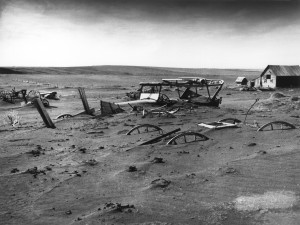Talking isn’t the first thing that comes to most people’s minds as a key ingredient for solving world hunger. But to University of Guelph Prof. Evan Fraser, it’s the first step toward creating a society that supports multi-pronged approaches to existing and looming food supply problems.
Fraser, who holds a Canada Research Chair in global human security, practices what he preaches. In the past year or so, he’s lectured or been interviewed at least 100 times about his view on the world’s food dilemma. The complexity of the food problem requires such dialogue, he says, to reduce the silos that have historically sprung up around other attempts to feed the hungry world.
These aren’t new problems, or even unique to modern society. Fraser cites problems that arose in the time of the vikings, as well as more recent disasters such as the Irish potato famine and the American “dust bowl.â€
They shared similar characteristics, leading up to them. Typically, the environment’s importance had been discounted by society. Agriculture mainly supported an affluent urban population, marginalizing rural people. And the most infamous droughts, diseases or famines were preceded by superb growing periods.
Comparing then and now, Fraser is convinced history is repeating itself and that we’re in a food crisis. Read more about his views in my Urban Cowboy column in the Guelph Mercury, and hear Fraser speak Tuesday evening at 7 p.m. in Guelph at the Guelph Seminar at Harcourt United Church. Proceeds from his talk will go to the Guelph Food Bank.
The photo above, from Wikipedia, depicts the impact of the Dust Bowl in South Dakota in 1936.


